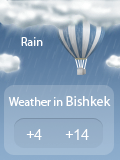‘Self-Help Groups are the Bridge to Peace and Development’ Forum
 16.12.2016 12:33
16.12.2016 12:33
On 14 December 2016 the ‘Self help groups are the bridge to peace and development’ forum was held in Osh as the closing event of WPU Erayim’s three-year project ‘The introduction of a combination of traditional and modern approaches to prevent conflict in the south of Kyrgyzstan’, supported by the German international organization Bread for the World (Brot für die Welt), which was launched in January 2014.
The forum was attended by the members of self help groups (SHGs) from the project area, project staff, and activists. The chairwoman of WPU Erayim, Rakhila Zhusupova, opened the forum, delivering a congratulatory speech and describing the progress of the project. She said:
"This project is for you, because we work for the people. We know what problems beneficiaries have, we have learned about them based on your needs and circumstances. We have explained to you in detail what a SHG is and what kind of goals it pursues when we first met three years ago. It is no wonder we used the concept of self help groups in this project for strengthening peace, friendship, harmony and unity of the people and to solve the basic needs through your own efforts. This method is widely used in several developed and developing countries, such as India, Bangladesh, Indonesia, and South Korea. Previously, we have told you about the experience ‘Saemaul Undong, which is translated as "Movement for a new village" program in South Korea. The creation of a SHG contributes to maintaining harmony, unity and friendship between ethnicities since people living in the same village, on the same street, despite their age and nationality, start to solve their own problems. They work in four areas. The economic area is one of the main areas that improves the lives of every family over time and creates the conditions for the development of entrepreneurship in rural areas. In the social area, SHG members address issues related to infrastructure, such as repairing roads in rural localities, problems with drinking water, and lighting. In the environmental area, SHGs work on landscaping and the preservation of the environment. The opening of maternity schools is an additional component of the project, under which forty maternity schools have been opened and attracted about thousand children.”
Next came a twenty minute video which showed the activities carried out within the project. Forum participants were divided into 4 groups to work in small groups on topics such as ‘small entrepreneurship and unemployment’, ‘education and society’, ‘ethnic culture and tolerance’, and ‘infrastructure and environment’. Each group used their own experience from their work. A round table will be held on 15 December, bringing together representatives of the local authorities, who work in partnership with the project, school principals, and social activists. Similar activities will be held in the Jalal-Abad province.












Baktykan Azhymamatova, Erayim Press















